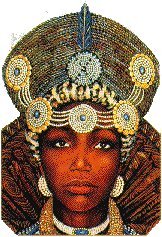Queen Nandi was a South African Zulu Queen and mother to Shaka Zulu. She was born Nandi Ndlovukazi kaBhebe in Melmoth, a small town in KwaZulu-Natal, South Africa in the 1760s. The word Nandi means The Sweet One. Her father, Bhebhe, was a minor chief. According to Zulu customs, she would have become a helper to her mother by the age of six, fetching water and eventually sowing the land and collecting firewood for the family home.
Returning from a visit with relatives, Nandi and her companions encountered a group of warriors accompanying the King of the Zulu people, Senzangakhona Kajama. Nandi and the King engaged in ukuhlobonga/ ukusoma, the act of sex without penetration, an act allowed to unmarried couples. Zulu customs require courtship, a chosen groom providing a gift/ lobola to the bride’s family, and acceptance of the gift by the family before marriage and sex. The lobola is considered a payment to the bride’s family for the right to her reproductive capabilities.
Senzangakhona and Nandi went beyond ukuhlobonga/ ukusoma, and Nandi became pregnant. She informed both the King and the Elders of his village, and her claim was initially rejected. Her pregnancy, however, became more evident, and Nandi gave birth to a son she named Shaka. King Senzangakhona kaJama eventually married Nandi, making her his third wife, but locked into a forbidden inter-clan marriage, she and Shaka were subject to constant abuse. Nandi finally fled the village and returned to her people, the eLangeni, leaving Shaka with his father.
Shaka suffered more abuse without his mother, and he was returned to her. The eLangeni, however, cast out Nandi and Shaka during the famine of 1802. She fled to Qwabe, where she met and married Gendeyana and had a son named Ngwadi. Nandi once again was tormented because her second marriage, also an inter-clan bond, was also forbidden. Nandi, Shaka, Ngwadi, and her daughter, Nomcoba, were taken in by the Mthethwa (Mtetwa) people, whose chief, Dingiswayo, allowed Shaka to join the ranks of his warriors. Eventually, Dingiswayo named Shaka his successor.
When King Senzangakhona died, Shaka took his father’s throne by force and announced that his mother, Nandi, would rule as his Queen. Nandi also became his closest advisor. She was now called Ndlorukazi, meaning The Great She Elephant. Nandi, however, ruled over the people who feared and disliked her. She rode an elephant and established regiments of all-female warriors. Shaka, however, idolized his mother and dealt harshly with her critics.
Queen Nandi died of dysentery on October 10, 1827. Shaka ordered a year of mourning that included all milk to be poured out, no crops to be cultivated, and all pregnant women killed along with their husbands. He also ordered ten living maidens to be buried alongside his mother to care for her in the afterlife and stationed 12,000 soldiers to guard her gravesite.
There is no known image of Nandi. The image used is an artist’s rendering of her.

